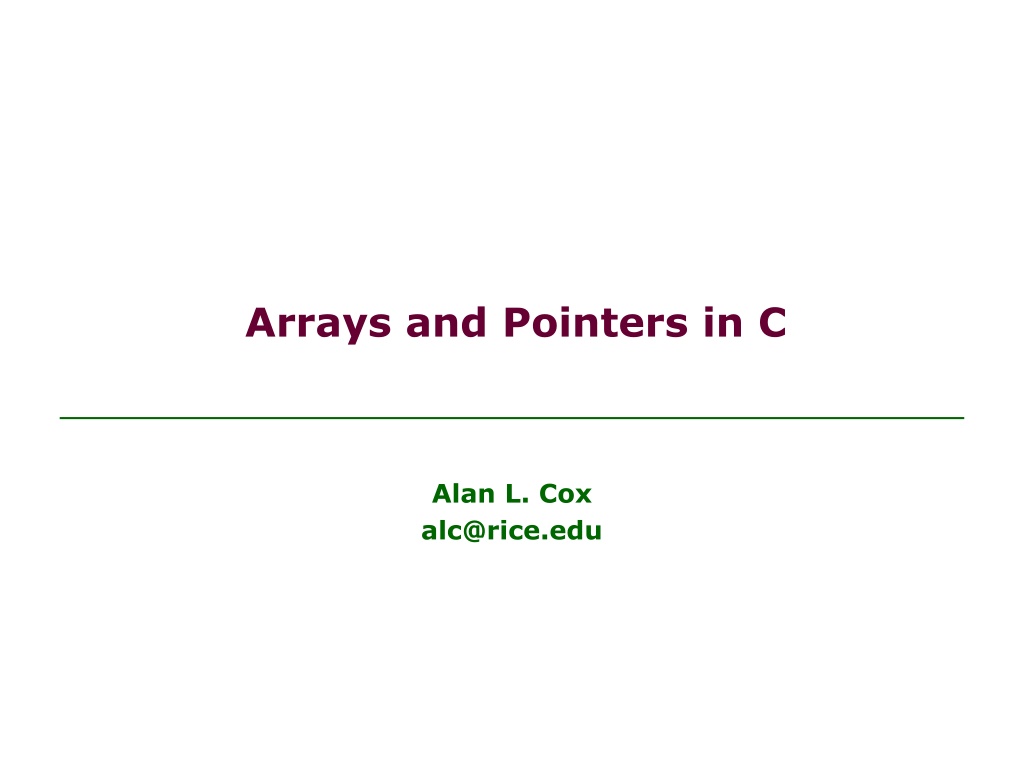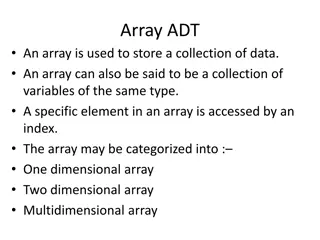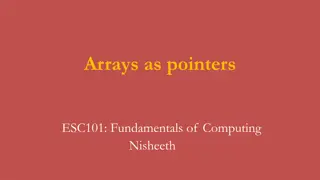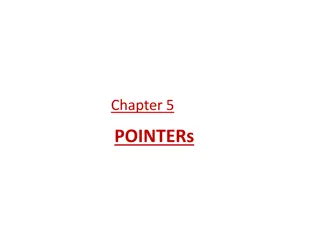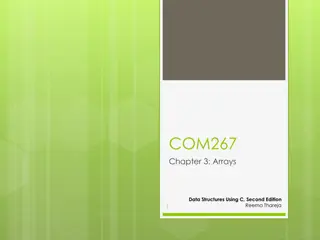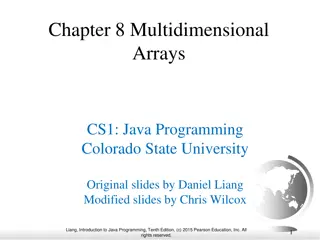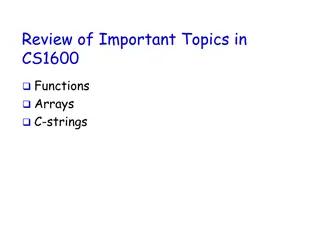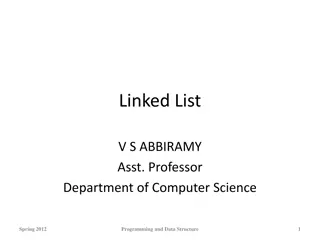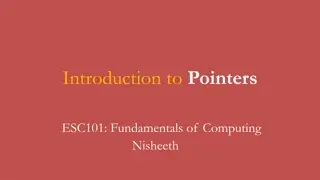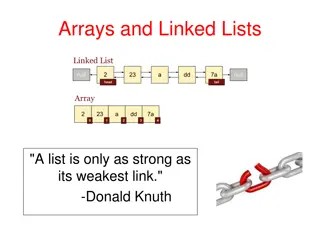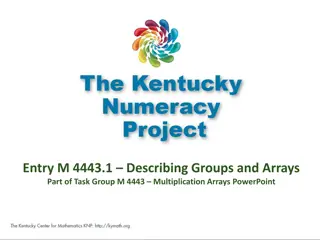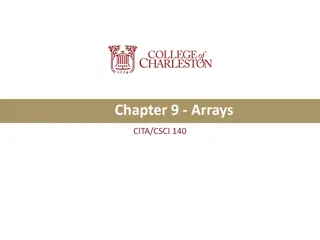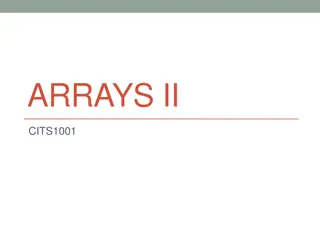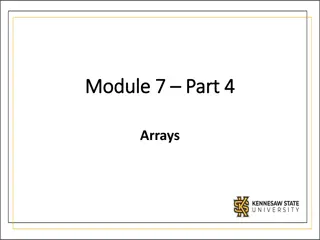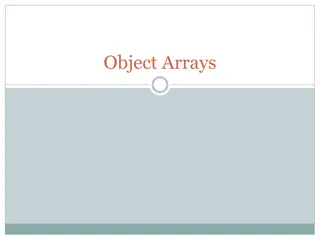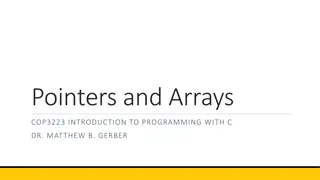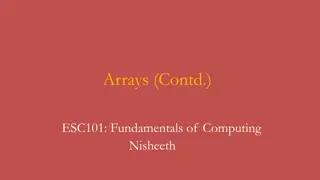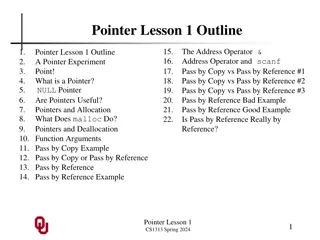Understanding Arrays and Pointers in C Programming
Explore the fundamentals of arrays, pointers, and strings in C programs, along with their representation at the machine level. Learn the similarities and differences between these data types and how to effectively use them in C programming. Dive into array indexing, representation, sizes, multi-dimensional arrays, and more with practical examples and insights.
Download Presentation

Please find below an Image/Link to download the presentation.
The content on the website is provided AS IS for your information and personal use only. It may not be sold, licensed, or shared on other websites without obtaining consent from the author. Download presentation by click this link. If you encounter any issues during the download, it is possible that the publisher has removed the file from their server.
E N D
Presentation Transcript
Arrays and Pointers in C Alan L. Cox alc@rice.edu
Objectives Be able to use arrays, pointers, and strings in C programs Be able to explain the representation of these data types at the machine level, including their similarities and differences Cox Arrays and Pointers 2
Arrays in C All elements of same type homogenous Unlike Java, array size in definition int array[10]; int b; Compare: C: Java: int array[10]; int[] array = new int[10]; First element (index 0) Last element (index size - 1) array[0] = 3; array[9] = 4; array[10] = 5; array[-1] = 6; No bounds checking! Allowed usually causes no obvious error array[10] may overwrite b Cox Arrays and Pointers 3
Array Representation Homogeneous An array of m data values is a sequence of m s bytes Indexing: 0th value at byte s 0, 1st value at byte s 1, Each element same size s bytes m and s are not part of representation Unlike in some other languages s known by compiler usually irrelevant to programmer m often known by compiler if not, must be saved by programmer a[2] 0x1008 int a[3]; a[1] 0x1004 a[0] 0x1000 Cox Arrays and Pointers 4
Array Representation char c1; int a[3]; char c2; int i; i 0x1014 c2 0x1010 a[2] 0x100C Could be optimized by making these adjacent, and reducing padding (by default, not) a[1] 0x1008 a[0] 0x1004 c1 0x1000 Array aligned by size of elements Cox Arrays and Pointers 5
Array Sizes int array[10]; What is sizeof(array[3])? 4 returns the size of an object in bytes sizeof(array)? 40 Cox Arrays and Pointers 6
Multi-Dimensional Arrays matrix[1][2] 0x1014 matrix[1][1] 0x1010 int matrix[2][3]; matrix[1][0] 0x100C matrix[0][2] 0x1008 matrix[1][0] = 17; matrix[0][1] 0x1004 matrix[0][0] 0x1000 Recall: no bounds checking Row Major Organization What happens when you write: matrix[0][3] = 42; Cox Arrays and Pointers 7
Variable-Length Arrays int function(int n) { int array[n]; New C99 feature: Variable-length arrays defined within functions Global arrays must still have fixed (constant) length Cox Arrays and Pointers 8
Memory Addresses Storage cells are typically viewed as being byte-sized Usually the smallest addressable unit of memory Few machines can directly address bits individually Such addresses are sometimes called byte- addresses Memory is often accessed as words Usually a word is the largest unit of memory access by a single machine instruction CLEAR s word size is 8 bytes (= sizeof(long)) A word-address is simply the byte-address of the word s first byte Cox Arrays and Pointers 9
Pointers Special case of bounded-size natural numbers Maximum memory limited by processor word-size 232 bytes = 4GB, 264 bytes = 16 exabytes A pointer is just another kind of value A basic type in C int *ptr; The variable ptr stores a pointer to an int . Cox Arrays and Pointers 10
Pointer Operations in C Creation &variable Dereference *pointer Indirect assignment *pointer=val Returns variable s memory address Returns contents stored at address Stores value at address Of course, still have... Assignment pointer=ptr Stores pointer in another variable Cox Arrays and Pointers 11
Using Pointers int i1; int i2; int *ptr1; int *ptr2; 0x1014 0x1000 ptr2: 0x1010 0x100C i1 = 1; i2 = 2; 0x1000 ptr1: 0x1008 i2: 0x1004 2 3 ptr1 = &i1; ptr2 = ptr1; i1: 0x1000 1 3 *ptr1 = 3; i2 = *ptr2; Cox Arrays and Pointers 12
Using Pointers (cont.) int int1 = 1036; /* some data to point to */ int int2 = 8; int *int_ptr1 = &int1; /* get addresses of data */ int *int_ptr2 = &int2; *int_ptr1 = int_ptr2; *int_ptr1 = int2; What happens? Type check warning: int_ptr2 is not an int int1 becomes 8 Cox Arrays and Pointers 13
Using Pointers (cont.) int int1 = 1036; /* some data to point to */ int int2 = 8; int *int_ptr1 = &int1; /* get addresses of data */ int *int_ptr2 = &int2; int_ptr1 = *int_ptr2; int_ptr1 = int_ptr2; What happens? Type check warning: *int_ptr2 is not an int * Changes int_ptr1 doesn t change int1 Cox Arrays and Pointers 14
Pointer Arithmetic pointer + number pointer number E.g., pointer+ 1 adds 1 something to a pointer char *p; char a; char b; int *p; int a; int b; p = &a; p += 1; p = &a; p += 1; In each, p now points to b (Assuming compiler doesn t reorder variables in memory) Adds 1*sizeof(char) to the memory address Adds 1*sizeof(int) to the memory address Pointer arithmetic should be used cautiously Cox Arrays and Pointers 15
A Special Pointer in C Special constant pointer NULL Points to no data Dereferencing illegal causes segmentation fault To define, include <stdlib.h> or <stdio.h> C23 introduces nullptr as a better alternative Cox Arrays and Pointers 16
Generic Pointers void *: a pointer to anything type cast: tells the compiler to change an object s type (for type checking purposes does not modify the object in any way) void *p; int i; char c; p = &i; p = &c; putchar(*(char *)p); Dangerous! Sometimes necessary Lose all information about what type of thing is pointed to Reduces effectiveness of compiler s type-checking Can t use pointer arithmetic Cox Arrays and Pointers 17
Pass-by-Reference void set_x_and_y(int *x, int *y) { *x = 1001; *y = 1002; } 1001 1 a 1002 2 b void f(void) { int a = 1; int b = 2; x y set_x_and_y(&a, &b); } Cox Arrays and Pointers 18
Arrays and Pointers Passing arrays: Dirty secret : Array name a pointer to the initial (0th) array element Must explicitly pass the size Really int *array int foo(int array[], unsigned int size) { array[size - 1] } a[i] *(a + i) An array is passed to a function as a pointer The array size is lost! int main(void) { int a[10], b[5]; foo(a, 10) foo(b, 5) } Usually bad style to interchange arrays and pointers Avoid pointer arithmetic! Cox Arrays and Pointers 19
Arrays and Pointers int foo(int array[], unsigned int size) { printf( %d\n , sizeof(array)); } What does this print? 8 ... because array is really a pointer int main(void) { int a[10], b[5]; foo(a, 10) foo(b, 5) printf( %d\n , sizeof(a)); } What does this print? 40 Cox Arrays and Pointers 20
Arrays and Pointers int i; int array[10]; int *p; int array[10]; for (i = 0; i < 10; i++) { array[i] = ; } for (p = array; p < &array[10]; p++) { *p = ; } These two blocks of code are functionally equivalent Cox Arrays and Pointers 21
Strings In C, a string is just an array of characters Terminated with \0 character Arrays for bounded-length strings Pointer for constant strings (or unknown length) char str1[15] = Hello, world!\n ; char *str2 = Hello, world!\n ; C, H e l l o , w o r l d !\nterminator C terminator: \0 Java, H e l l o , w o r l d !\n length Cox Arrays and Pointers 22
String length Must calculate length: can pass an array or pointer int strlen(char str[]) { int len = 0; Check for terminator array access to pointer! while (str[len] != \0 ) len++; What is the size of the array??? return (len); } Provided by standard C library: #include <string.h> Cox Arrays and Pointers 23
Pointer to Pointer (char **argv) Passing arguments to main: size of the argv array/vector int main(int argc, char **argv) { ... } an array/vector of char * Recall when passing an array, a pointer to the first element is passed Suppose you run the program this way UNIX% ./program hello 1 2 3 argc == 5 (five strings on the command line) Cox Arrays and Pointers 24
char **argv 3 argv[4] 0x1020 These are strings!! Not integers! 2 argv[3] 0x1018 1 argv[2] 0x1010 argv[1] 0x1008 hello argv[0] 0x1000 ./program Cox Arrays and Pointers 25
Next Time Structures and Unions Cox Arrays and Pointers 26
